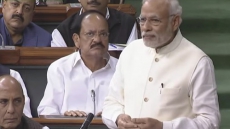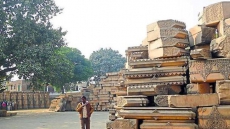The Supreme Court on Tuesday quizzed the Muslim parties on two strands of submissions in the Ayodhya title dispute - how do they justify that the figurines (animals, birds, flowers and humans) present in the disputed structure, are not found in any other mosque and secondly, how a voluntary report by four historians claims that the Babri Masjid's location was not the birthplace of Lord Ram.
Senior advocate Rajeev Dhavan, appearing for Sunni Central Waqf Board, in the first-half of the day-long hearing told the court that it is not enough that there is a belief to treat Ram Janmabhoomi as a juristic person, subject to law.
"There has to be more, for example, manifestation and continuity of worship......Babri mosque is a property of Allah," contended Dhavan before a Constitution bench comprising five judges and headed by Chief Justice Ranjan Gogoi.
One of the judges on the bench, from the pictures submitted as evidence in the case, queried Dhavan on the carvings of two lions referred as "Sinh Dwar" (lion gate) and pointed out that the bird between the lions was referred as "Garuda" by the Hindus parties. These pictures of the inside of the temple, presence of figurine on "Kasauti Pillars", were clicked before the destruction of the mosque.
Justice S.A. Bobde referred to Hindu parties' argument where they claimed that images of flowers and animals can never part of the mosque as per Islam. Hindu parties claimed that the mosque was built on a Hindu temple, and the remains of the temple was used for the construction of the mosque.
Dhavan contended that floral design existed in the Islamic art. Justice Bobde again quizzed Dhavan, "Is there any evidence in this case about figurine of such nature being present in any other mosque." Dhavan replied No, and contended "we were not asked to produce such evidence." Dhavan contested that who brought the pillars is still a mystery.
Dhavan told the bench that Muslims prayed at the west wall of the mosque, and they did not pray to the idols. "Because of certain figurines on the pillars the mosque and Islam is out, it is not possible," contested Dhavan. Justice Ashok Bhushan said that Hindu parties' claim these pillars form the basis of the temple. Justice D Y Chandrachud opined that presence of it (figurines) could have been a sign of cultural assimilation of religion when they came to India from other parts of the world.
Dhavan replied it could have been so. At this, Justice Bobde quipped at Dhavan, "Was there any evidence of any witness saying that this was result of cultural assimilation?" Dhavan said no. Justice Ashok Bhushan queried Dhavan on the images of 'dwarpals' (person guarding the gate) at "Hanuman Dwar". "Images of Jay and Vijay as dwarpals of Lord Vishnu. It has come into evidence, one of the judges queried Dhavan.
Justice Chandrachud said "These depictions in the pillars indicate that there is some sacral connotation to these pillars. Some belief of Hindus towards the object of worship is at the same place of mosque....these pillars symbols of deity?.......pillars part of the temple." Justice Bobde asked to bring records of arguments on the same issue before the Allahabad High Court.
In the second-half of the hearing, Dhavan argued on a report submitted by four well known historians, who concluded that Babri Masjid is not the birthplace of Lord Ram. He also added that High Court judgement does not mention historians' report to the nation.
Justice Bobde asked Dhavan, "Who asked them to make this report." The other counsel for Muslim parties' replied that these historians took part in a discussion and then brought out the report. Justice Bobde said "so they volunteered? The court reckoned that this report was an opinion and its evidentiary value could be challenged.
"The historians did not benefit from the archaeological evidence," said a judge. Dhavan argued imagined history cannot form basis of faith. Justice Chandrachud pointed a puzzle to Dhavan that this report has been challenged by Vishwa Hindu Parishad (VHP) and Muslim parties challenge VHP's assessment.
Justice Bhushan referred to the report as an opinion again. "Had it been on data procured by excavations done by Archaeological Survey of India....the methodology they follow their inquiry was perfunctory," observed the court closing the arguments for the day. The hearing will continue on Wednesday.

